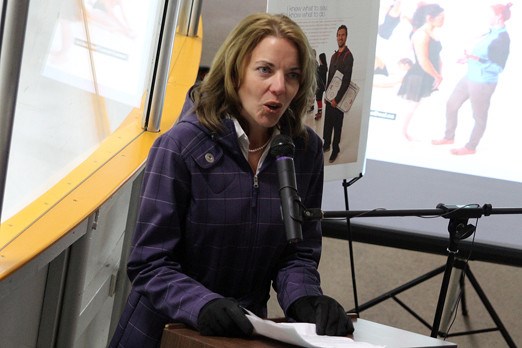Sometimes a coach is the first person who realizes something’s wrong with the mental state of one of his or her players.
The Youth Suicide Prevention Task Force hopes that familiarity can help save young lives and is reaching out to coaches and other leaders in Thunder Bay in a new ad campaign, An Athlete Needs You, and a corresponding video designed to teach them the signs of suicide before it’s too late.
Changes in behaviour, attitude or appearances or withdrawing from team activities don’t automatically point to suicide, but they do give an indication something might be wrong, said Lynda Fraser, chairwoman of the YSPTF campaign committee.
Recognizing depression is a major step in breaking stopping thoughts of suicide in their tracks.
“It will help make a big difference in about 80 per cent of those people, allowing them get back to their regular activities,” said Fraser, a health promotion planner with the Thunder Bay District Health Unit.
Fraser said a survey of local coaches shows they are encountering situations they’re not sure how to handle.
“The coach wasn’t always sure what their role should be, what they should say or what they should do. Therefore we developed this campaign to encourage coaches and leaders they can make a real difference to a young person and that all it takes is starting a conversation,” she said.
Melanie Salatino, a former coach with the Thunder Bay Bantam ‘A’ Queens hockey team, said she understands the difficulty both youngster and adults might have discussing topics as taboo and touchy as suicidal thoughts.
But while a coach isn’t a parent or a close friend, they can be a confidante and do have a role in the lives of their players that extends beyond the rink or playing field.
“In my best experiences, if something seemed wrong with a player, I would usually approach them and ask them what was up,” Salatino said.
“At times I felt that being a female and working with young women, it was (actually) easier for the athlete to discuss things with me. I always wanted the player to know I was there for them in case they needed someone to talk to.”
Fraser said that’s the first, and often most important, step.
“We want to link our young people to the help that they need when they need it. Our campaign also includes several other resources such as posters, rink boards, website information, cards and a video.”
The video, shot at Fort William Gardens, show a coach discussing a player with another coach, wondering how to tackle the situation.
The player appears to no longer care about hockey and had missed several practices. After discussing it with his fellow coach, played by Salatino, he decides to pull the player aside after practice to have a heart-to-heart.
Teen athlete Megan Pachnosky said it can make a difference.
“I’ve participated in many sports, such as dance, volleyball and soccer and the guidance of a coach or mentor is very helpful,” she said.
The task force has reached out to educators and parents in the past, and plan to reach out to health-care professionals on the topic of youth suicide.



